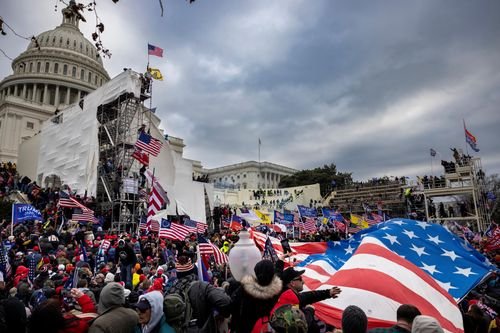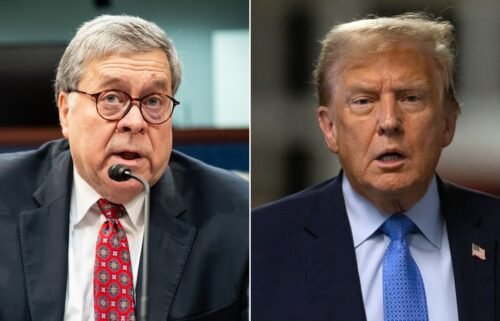READ: Excerpts from Democrats’ impeachment trial brief

The House impeachment managers provided a detailed legal analysis in their pre-trial legal brief, filed Tuesday, about the constitutionality of charging Trump with incitement of insurrection. Excerpts of the brief are available below:
“On January 6, 2021, with Vice President Michael Pence presiding, Congress assembled to perform one of its most solemn constitutional responsibilities: the counting of electoral votes for President of the United States. This ritual has marked the peaceful transfer of power in the United States for centuries. Since the dawn of the Republic, no enemy—foreign or domestic—had ever obstructed Congress’s counting of the votes. No President had ever refused to accept an election result or defied the lawful processes for resolving electoral disputes. Until President Trump.”
“President Trump’s responsibility for the events of January 6 is unmistakable.”
“President Trump’s conduct must be declared unacceptable in the clearest and most unequivocal terms. This is not a partisan matter. His actions directly threatened the very foundation on which all other political debates and disagreements unfold. They also threatened the constitutional system that protects the fundamental freedoms we cherish. It is one thing for an official to pursue legal processes for contesting election results. It is something else entirely for that official to incite violence against the government, and to obstruct the finalization of election results, after judges and election officials conclude that his challenges lack proof and legal merit.”
There can be no question that former President Trump did, in fact, whip his supporters into a frenzy and aim them at the Capitol.
“Following the Electoral College vote, President Trump fixated on January 6, 2021—the date of the Joint Session of Congress—as presenting his last, best hope to reverse the election results and remain in power. Even as he continued improperly pressuring state officials, DOJ, and Members of Congress to overturn the electoral outcome, he sharply escalated his public statements, using more incendiary and violent language to urge supporters to ‘stop the steal’ on January 6. He insisted that the election had been ‘rigged’ and ‘stolen,’ and that his followers had to ‘fight like hell’ and ‘fight to the death’ against this ‘act of war,’ since they ‘can’t let it happen’ and ‘won’t take it anymore!’ These statements turned his ‘wild’ rally on January 6 into a powder keg waiting to blow. Indeed, it was obvious and entirely foreseeable that the furious crowd assembled before President Trump at the ‘Save America Rally’ on January 6 was primed (and prepared) for violence if he lit a spark.”
This is not a routine corruption charge. Trump has committed an impeachable offense of historic proportions.
“President Trump’s effort to extend his grip on power by fomenting violence against Congress was a profound violation of the oath he swore. If provoking an insurrectionary riot against a Joint Session of Congress after losing an election is not an impeachable offense, it is hard to imagine what would be. The Framers themselves would not have hesitated to convict on these facts.”
“The gravity of President Trump’s offense is magnified by the fact that it arose from a course of conduct aimed at subverting and obstructing the election results. Since President George Washington willingly relinquished his office after serving two terms, our Nation has seen an unbroken chain of peaceful transitions from one presidential administration to the next—that is, until January 6, 2021. President Trump’s incitement of insurrection disrupted the Joint Session of Congress as it performed its duty under the Twelfth Amendment to count the Electoral College votes. Although this assault was put down after several hours, and the Joint Session fulfilled its responsibility later that night, President Trump’s abuse of office threatened and injured our democratic order. Under absolutely no circumstance may a candidate for any position, at any level of government, respond to electoral defeat by provoking armed violence.”
“Since our Nation was founded, it has been well recognized that impeachment is warranted for ‘betrayal of the Nation’s interest—and especially for betrayal of national security.’ President Trump’s pursuit of power at all costs is a betrayal of historic proportions. It requires his conviction.”
Trump and his supporters cannot hide behind due process complaints.
“Any process-based objections to this impeachment are wrong. This case does not involve secretive conduct, or a hidden conspiracy, requiring months or years of investigation. It does not raise convoluted legal questions about the definition of a high crime and misdemeanor. And the gravity of the President’s abuse—as well as the continuing nature of the threat it poses to our democracy if left unanswered—demand the clearest of responses from the Legislative Branch. Indeed, hundreds of people have already been arrested and charged for their role in the events of January 6. There is no reason for Congress to delay in holding accountable the President who incited the violent attack, inflamed the mob even as it ransacked the Capitol, and failed to take charge of a swift law enforcement response because he believed such dereliction of duty might advance his political interest in overturning the results of an election that he lost.”
The Senate clearly has jurisdiction to hear this case—backed by the plain text of the Constitution and more than two centuries of its own precedent.
“Given the overwhelming strength of the case against him, we expect President Trump will seek to escape any reckoning for his constitutional offenses by asserting that the Senate lacks jurisdiction over him as a former official. That argument is wrong. It is also dangerous. The period in which we hold elections and accomplish the peaceful transfer of power is a source of great pride in our nation. But the transition between administrations is also a precarious, fragile time for any democracy—ours’ included. The Framers anticipated these risks and emphasized that presidential abuse aimed at our democratic process itself was the single most urgent basis for impeachment. It is unthinkable that those same Framers left us virtually defenseless against a president’s treachery in his final days, allowing him to misuse power, violate his Oath, and incite insurrection against Congress and our electoral institutions simply because he is a lame duck. There is no ‘January Exception’ to impeachment or any other provision of the Constitution. A president must answer comprehensively for his conduct in office from his first day in office through his last. Former President John Quincy Adams thus declared, ‘I hold myself, so long as I have the breath of life in my body, amenable to impeachment by [the] House for everything I did during the time I held any public office.'”
“It is particularly obvious that the Senate has jurisdiction here because President Trump was in office at the time he was impeached. There can be no doubt that the House had authority to impeach him at that point. So the question is not whether a former official can ever be impeached by the House—though, as we will explain, this is indeed authorized. The only issue actually presented is whether the Senate has jurisdiction to conduct a trial of this impeachment. And Article I, Section 3, Clause 6 provides a straightforward answer to that question: ‘The Senate shall have the sole Power to try all Impeachments’ (emphasis added).”
“Accordingly, the Senate should not turn aside from centuries of its own practice and understanding. President Trump is personally responsible for inciting an armed attack on our seat of government that imperiled the lives of the Vice President, Members of Congress and our families, and those who staff and serve the Legislative Branch. The Nation cannot simply ‘move on’ from presidential incitement of insurrection. If the Senate does not try President Trump (and convict him) it risks declaring to all future Presidents that there will be no consequences, no accountability, indeed no Congressional response at all if they violate their Oath to ‘preserve, protect and defend the Constitution’ in their final weeks—and instead provoke lethal violence in a lawless effort to retain power. That precedent would horrify the Framers, who wrote the Presidential Oath of Office into the Constitution and attached no January Exception to it. President Trump must therefore stand trial for his high crimes and misdemeanors against the American people.”
The Framers of the Constitution clearly intended for the impeachment process to reach former officials.
“As revolutionaries who overthrew a king, the Framers obsessed over protecting their young Republic from the abuse of power. Based on the history of impeachment in England and the early American states, they would have considered it self-evident that a former official like President Trump could be impeached and tried for high crimes and demeanors he had committed in office.”
“The records of the Constitutional Convention and a close study of the Constitution’s text confirm that a former official like President Trump remains subject to impeachment and trial for high crimes and misdemeanors. History, originalism, and textualism thus leave no doubt that the Senate has jurisdiction—and a constitutional duty—to decide this case on the merits.”
The Senate found that it had the power to try former officials in 1798. That has been the rule ever since.
“President Trump may assert that finding jurisdiction here will invite the House to undertake a slew of other impeachments, dusting off old issues and pursuing tired grudges. But history disproves such slippery slope concerns. For centuries, the prevailing view—bolstered by the Blount and then Belknap precedents—has been that former officials are subject to impeachment. Yet only in Belknap’s case did the House take that step. In the vast majority of cases, including that of President Richard Nixon, the House has properly recognized that an official’s resignation or departure abated any need for the extraordinary remedy of impeachment. That remains true today: ‘There is no likelihood that we shall ever unlimber this clumsy and bulky monster piece of ordinance to take aim at an object from which all danger has gone by.’ But President Trump’s case is exceptional. The danger has not ‘gone by.’ The threat to our democracy makes Watergate pale in comparison—and remains with us to this day. Here is the rare case in which love of the Constitution, and commitment to our democracy, required the House to impeach President Trump. And for the same reasons, the Senate can and must take jurisdiction.”
Trump is personally responsible for a violent attack on the Capitol. He was impeached while still in office. The case for trying him after he has left office is stronger than any of the precedents.
“Prior practice of the House and Senate point the same way as a careful study of the Constitution. Indeed, the case for exercising jurisdiction over President Trump—and convicting him of high crimes and misdemeanors—is even stronger than in any of these precedents.”
“In fact, as noted above, the case for jurisdiction here is stronger than in any of the precedents just mentioned. Unlike Senator Blount, who was held accountable through expulsion, President Trump will escape responsibility for his betrayal of the Constitution unless this body tries and convicts him. Unlike Secretary Belknap, who resigned before the House could act, President Trump was impeached by the House while he was still in office. Moreover, whereas Secretary Belknap and Judge English left office in disgrace, President Trump insists that his constitutional offenses were perfectly acceptable—and so the precedent set by a failure to try him would pose an astronomically greater threat to the Republic. Finally, unlike in the case of Judge Archbold, the evidence against President Trump is overwhelming. His is personally responsible for an attack that unleashed death and mayhem at the Capitol amid the transfer of power. For Congress to stand aside in the face of such conduct would be a grave abdication of its constitutional duty, and an invitation for future Presidents to act without fear of constraint during their final months in office.”
The Constitution was designed to address precisely this kind of misconduct. The Senate must convict Trump and hold him accountable.
“Constitutional history, text, and structure, as well as prior Congressional practice, all confirm that the Senate has jurisdiction to try President Trump. So does common sense. While sworn to faithfully execute the laws—and to preserve, protect, and defend the Constitution—President Trump incited insurrection against the United States government. His conduct endangered the life of every single Member of Congress, jeopardized the peaceful transition of power and line of succession, and compromised our national security. This is precisely the sort of constitutional offense that warrants disqualification from federal office. President Trump has proven his willingness to break and brutalize the law in his quest for power. The Senate must establish beyond doubt, for all time, and for officials of all political parties that President Trump’s behavior was intolerable.”
The former President also cannot hide behind a specious “free speech” argument.
“The First Amendment exists to protect our democratic system. It supports the right to vote and ensures robust public debate. But rights of speech and political participation mean little if the President can provoke lawless action if he loses at the polls. President Trump’s incitement of deadly violence to interfere with the peaceful transfer of power, and to overturn the results of the election, was therefore a direct assault on core First Amendment principles. Holding him accountable through conviction on the article of impeachment would vindicate First Amendment freedoms—which certainly offer no excuse or defense for President Trump’s destructive conduct.”
“Separate from these legal points, President Trump may assert that this impeachment reflects ‘cancel culture’ or some supposed intolerance of his right to voice objections to the election results. That would be a red herring. President Trump endangered the very constitutional system that protects all other rights, including freedom of expression. It would be perverse to suggest that our shared commitment to free speech requires the Senate to ignore the obvious: that President Trump is singularly responsible for the violence and destruction that unfolded in our seat of government on January 6.”
At base, the riot was Trump’s last-ditch effort to hold onto power.
“President Trump falsely asserted that he won the 2020 election and then sought to overturn its results. He and his supporters filed dozens of lawsuits nationwide—including before judges he had appointed—but their claims uniformly failed to persuade. He also tried to convince state and federal election officials and law enforcement personnel to attempt to reverse the election outcome. These attempts failed, too. The only honorable path at that point was for President Trump to accept the results and concede his electoral defeat. Instead, he summoned a mob to Washington, exhorted them into a frenzy, and aimed them like a loaded cannon down Pennsylvania Avenue. As the Capitol was overrun, President Trump was reportedly ‘delighted.’ And rather than take immediate steps to quell the violence and protect lives, President Trump left his Vice President and Congress to fend for themselves while he lobbied allies to continue challenging election results.”
The Senate should disqualify Trump for office and make certain that he can never harm our country again.
“President Trump’s incitement of insurrection requires his conviction and disqualification from future federal officeholding. This is not a case where elections alone are a sufficient safeguard against future abuse; it is the electoral process itself that President Trump attacked and that must be protected from him and anyone else who would seek to mimic his behavior. Indeed, it is difficult to imagine a case that more clearly evokes the reasons why the Framers wrote a disqualification power into the Constitution. The need for conviction and disqualification is further supported by Section 3 of the Fourteenth Amendment, which bars from government service those who ‘having previously taken an oath … to support the Constitution of the United States, shall have engaged in insurrection or rebellion against the same, or given aid or comfort to the enemies thereof.’ President Trump’s conduct offends everything that the Constitution stands for. The Senate must make clear to him and all who follow that a President who provokes armed violence against the government of the United States in an effort to overturn the results of an election will face trial and judgment.”




